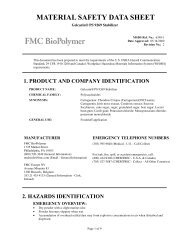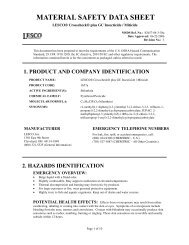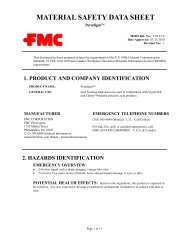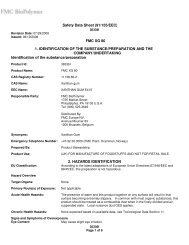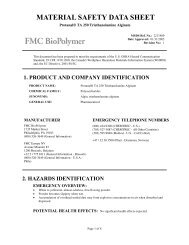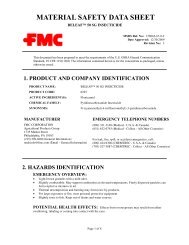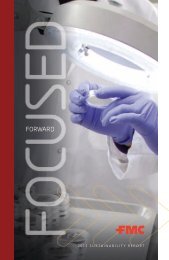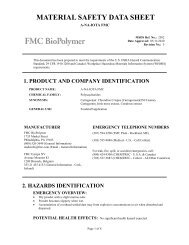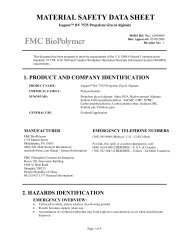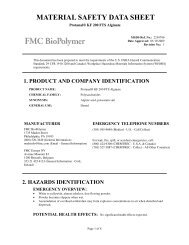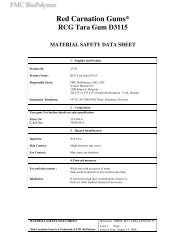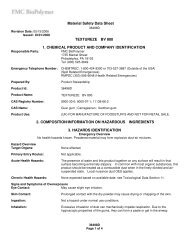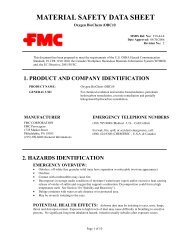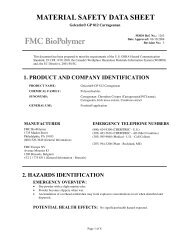Chairman's - FMC Corporation
Chairman's - FMC Corporation
Chairman's - FMC Corporation
You also want an ePaper? Increase the reach of your titles
YUMPU automatically turns print PDFs into web optimized ePapers that Google loves.
emissivity glass, solar panel glass etc.) and will increase the need for this essential raw material from <strong>FMC</strong>. The<br />
soda ash industry has an interest in assuring that climate change legislation or regulation recognizes the benefits<br />
of soda ash (particularly natural soda ash) and the challenges facing this industry in controlling its greenhouse<br />
gas emissions.<br />
On June 26, 2009, the U.S. House of Representatives passed the “American Clean Energy and Security Act<br />
of 2009,” which would regulate the emission of greenhouse gases. This legislation includes provisions specific to<br />
soda ash, recognizing that as an energy and trade intensive industry it should not be penalized relative to less<br />
efficient international competition. The United States Senate is working on its own climate change legislation,<br />
but this legislation has not been passed and contains significant differences from the corresponding House<br />
legislation. For any new climate change legislation to become law, both chambers of Congress would be required<br />
to approve the same legislation, and the President would have to sign the bill. It is not possible at this time to<br />
predict whether or when the Senate might act on climate change legislation, or what provisions of the House or<br />
Senate legislation would be modified in order to be reconciled with each other to arrive at one unified bill.<br />
In the absence of federal climate change legislation, the Environmental Protection Agency (EPA) has moved<br />
forward with a finding of “endangerment” and a proposed “tailoring rule” to apply the Prevention of Significant<br />
Deterioration (PSD) provisions of the Clean Air Act to greenhouse gas emissions. This rule is expected to be<br />
challenged in court, and there may be bills introduced in Congress to withdraw EPA’s authority to regulate<br />
greenhouse gases under the Clean Air Act while Congress considers enactment of federal legislation. Even if the<br />
“tailoring rule” is upheld, EPA has not clarified how the rule will be implemented.<br />
Because of the many variables, it is premature to make any estimate of the costs of complying with<br />
un-enacted federal climate change legislation or as yet un-promulgated federal regulations.<br />
At this point our U.S. facilities are not subject to any state or regional greenhouse gas regulation, and our<br />
foreign operations outside of Europe and Canada are not subject to national or local greenhouse gas regulation.<br />
Although some of our European and Canadian operations may be subject to greenhouse gas regulation, the cost<br />
to these facilities has not been and is not expected to be significant, and effect of European Union and Canadian<br />
greenhouse gas regulation has not been and is not expected to be material to <strong>FMC</strong>.<br />
We have considered the potential physical risks to <strong>FMC</strong> facilities and operations and the indirect<br />
consequences of regulation or business trends as a result of potential future climate change. Because of the many<br />
variables, not only with respect to the science, but also with respect to the nature and effect of future global<br />
climate change regulation itself, it is impossible to predict in any meaningful way what type of property damage<br />
or disruptions to our operations or indirect consequences might result from future climate change.<br />
Recently Adopted and Issued Accounting Pronouncements and Regulatory Items<br />
See Note 2 to our consolidated financial statements included in this Form 10-K.<br />
Critical Accounting Policies<br />
Our consolidated financial statements are prepared in conformity with U.S generally accepted accounting<br />
principles. The preparation of these financial statements requires us to make estimates and judgments that affect<br />
the reported amounts of assets, liabilities, revenues and expenses. We have described our accounting policies in<br />
Note 1 to our consolidated financial statements included in this Form 10-K. We have reviewed these accounting<br />
policies, identifying those that we believe to be critical to the preparation and understanding of our consolidated<br />
financial statements. We have reviewed with the Audit Committee those accounting policies that we have<br />
deemed critical. These policies are central to our presentation of results of operations and financial condition and<br />
require management to make estimates and judgments on certain matters. We base our estimates and judgments<br />
on historical experience, current conditions and other reasonable factors.<br />
48



